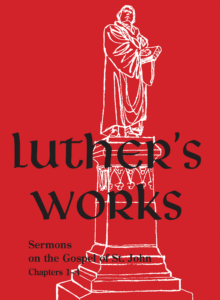Luther on the Sound of the Wind (John 3)
Co-missioners,
Our editor has been poking around some more in Luther’s Works. We send you something he wants to share as a follow-up of sorts to last week’s post.
Peace and Joy,
The Crossings Community
________________________________________________________________
Luther on the Sound of the Wind (John 3)
by Jerome Burce
Earlier this week a pending pericope study sent me to the American edition of Luther’s Works (hereafter LW) to find out what Luther might have to say about the ninth chapter of St. John. That’s the gospel appointed for this coming Fourth Sunday in Lent, Series A in the Revised Common Lectionary. It tells of Jesus giving sight to the man born blind.
I soon discovered that Luther doesn’t address this episode, at least not in the three volumes that LW devotes to his sermons on John. I should have known this, of course. Thirty-five years ago, a retired pastor gave me his complete set of LW. It consisted at the time of fifty-five volumes. More have been published since. Not that I’ve added to the initial benefaction, which itself has gone scandalously underused for as long as I’ve owned it. May the pastor I bestow it on in ten or twenty years scuff up far more of its pages.
I don’t blush too much in ‘fessing up to this. I figure that among those who read these words are other parish pastors who spent too much time fiddling with bulletins and newsletters and not nearly enough with their noses in the books where such noses belong. Other readers—many more, I should think—will count themselves lucky to have had a single volume of Luther’s writings on their shelves along the way, let alone a whole set.
With this in mind I start with some information so basic as to cause any self-respecting scholar to roll their eyes.
The sermons presented in the aforementioned volumes of LW amount to almost 1400 pages of limpid English translation by Martin Bertram, Robert’s father. They cover only ten of John’s 21 chapters, 1-4 (Vol. 22), 6-8 (Vol. 23), and 14-16 (Vol. 24). Of these, chapter 4 gets the lightest treatment, a mere four sermons. By contrast, it takes twenty-seven sermons for Luther to work his way through chapter 3. He did this in 1538, in the middle of a three-year stretch when he was covering for Wittenberg’s parish pastor, Johannes Bugenhagen, who was on a reforming mission to Denmark. John’s Gospel seems to have been Luther’s go-to text when tasked with supply preaching. A similar absence by Bugenhagen in 1530-31 had led to the forty-five sermons on chapters 6-8. During the later absence of ’37-’39 he began with chapters 14-16. Only then did he turn to John’s own beginning, chapters 1-4—or so say the notes by Jaroslav Pelikan, editor of the volumes in question. The word “systematic” rarely comes up in discussions of Luther. No wonder.
The word that does apply to Luther’s sermons is “Thorough” (capital “T” intended). His approach is expository. He reads a verse, discusses it at length, then moves on to the next verse. At some point he stops, though what causes him to stop I haven’t ascertained. (Tongue in cheek: d id a bell ring? Did Katie cough?) The next sermon picks up where the last one left off. When compiled, what one gets in effect is a commentary on the chapters in question, accessible also to lay readers. That’s how these were presented when they first appeared in print, with the editor of one volume going so far as to remove any indication of where one sermon ends and the next begins.
One looks in vain in these sermons for the kind of organizing principles that some of us were taught in preaching classes. There is no obvious structure in the unfolding of Luther’s thought. One spots no glimmers of Richard Caemmerer’s Goal-Malady-Means approach, and still less of the six-step Diagnostic/Prognostic method that Crossings touts. Luther would have found the latter bemusing, not to say laughable, for the reason that it pushes preachers to face a reality that Luther took to be utterly obvious. We are sinners. As such, we have a problem with God, who has a problem with us. We need the Christ God gave to solve this problem for us. It’s in the trusting of this Christ that enduring life begins. It’s God’s own, most gracious self who, through the Spirit, makes this trusting happen. Such is Luther’s drumbeat. The implacable God-against-us whom we encounter every day—“Listen to the Law! Take it seriously!”—turns out in Christ to be wondrously for us. “Hear the Gospel! Trust what you hear!”
With that we get to what strikes me as the operative (if not the organizing) principle in all these sermons. Ed Schroeder taught some of us to call it the “double dipstick” test for genuine gospel, where “dipstick”—as in a car—is a probe for the stuff that needs to be there for the thing to work the way it’s supposed to, be it an engine or a sermon. Where the latter is concerned, be sure of two things when you deliver God’s Gospel: a) that Christ is getting all the glory and b) that troubled consciences are being comforted. This is precisely Luther’s project as a preacher. He says as much himself in the opening paragraph of his first sermon on John 1.
“Therefore we propose to consider [St. John’s] Gospel in the name of the Lord [i.e. Jesus], discuss it, and preach it as long as we are able, to the glory of Christ [Dipstick A] and to our own welfare, comfort, and salvation [Dipstick B], without worrying whether the world shows much interest in it.” (LW 22:5)
And so Luther does for those almost 1400 pages I mentioned earlier. There he delivers the Gospel goods to the people he’s looking at and talking to in 16th century Wittenberg. What he says is uniformly relevant to their daily experience. It is also consistently cast in the down-to-earth language they speak among themselves. It comes across from start to finish as God’s message to them, though even better, as God’s message for them.
Would that every Lutheran preacher in the 21st century tackled their work in the same way, with the same double-dipstick goals in mind. But here I’m begging for a miracle, certainly where the American Lutheran scene is concerned. Still, the God I’m begging to specializes in miracles, so by all means, beg with me.
+ + +
A brief example, then, of Luther’s work in John.
Again, what sent me to these sermons in the first place was a question of how he handles the matter of blindness that predominates in John 9. On finding nothing on this, I fell to wondering about a question left over from two Sundays ago, when we listened to Jesus’ conversation with Nicodemus in John 3. Verse 8 has always puzzled me. “The wind blows where it chooses,” Jesus says. “You hear the sound of it, but you do not know where it comes from or where it goes. So it is with everyone who is born of the Spirit.”
A quick note here: the object of this metaphor is not the Spirit Itself—a common misperception—but rather people born of the Spirit. What might Luther make of this?
Quite a bit, as it turns out. He starts his treatment of verse 8 in the latter part of one sermon with an extended reflection on the nature of wind as a reality that can’t be denied—we hear it, we feel it—and yet it can’t be explained. 21st century hearers might disagree on this latter point. Still, it leads usefully to the following:
“Listen, even though you do not understand this. The sound of the wind is also heard in this Word of God: ‘I baptize you in the name of the Father and of the Son and of the Holy Spirit.’ Furthermore, you also have the wind in the baptismal water; the Holy Spirit is blowing there. You cannot understand how a [person] can be renewed by water and the Holy Spirit, nor how one who died can live anew. But believe it, accept it, and content yourself with hearing the sound of water and with feeling the water and the sound of the Holy Spirit. It matters not that you cannot understand how you are renewed. Just say: ‘I will believe it. I do not know either whence the wind comes; and still I know that it exists, and I can hear and feel it. Thus I will also believe God when He says that Baptism initiates a new birth, even though I cannot understand how it can renew me, keep and preserve me for eternal life. I will simply hear the Word, accept the water of Baptism, and believe. After all, I have to accept far lesser things without understanding them. The fact that I was born anew this way is just as true as the fact that I hear the wind. Just as I know that I hear and feel the wind but do not know whence it comes, so I shall also believe that I am born anew by water and the Holy Spirit and that the old [person] in me must die if I wish to enter eternal life.” (LW 22:295)
Luther sticks with this theme in the next two sermons. It’s as if the “sound of the wind” has somehow gripped him. He makes much use of it. Here are two more snippets:
“No one sees the Holy Spirit; no one touches Him. I know not whence He comes and where He goes. Thus I cannot see a Christian either. Nor can I say: ‘At this time and in this place I shall become a Christian.’ In brief, it is invisible; neither time nor place can be fixed for it; it is intangible; it can’t be felt, it can’t be clothed, it does not consist in anything than can be seen and felt—it is sheer nothing.
“But what good is it to me if it is nothing? Yes, it is nothing if you ask your five senses about it and consult with your reason and wisdom. You must put reason and senses aside and remember that what makes a Christian is something of which you hear no more than the breath and sound. You hear the voice. Follow it and believe it, and you will be born anew.” (LW 22:300)
Notice the gentle encouragement in that final sentence. And finally—
“Here the Lord explains the meaning of sound. It is the physical Word that one hears, the testimony and speeches delivered by preachers; it is the proclamation of the Word of God. In all Christendom we have nothing greater or more sublime than the Word of God. We hear the sound of the wind; Holy Scripture presents the Word to us everywhere; for instance, in Baptism, where the Word is the principal item. One hears the Word and feels the water, and without the Word Baptism is nothing. What can water accomplish without the Word of God? Likewise, in Holy Communion bread and wine are of no effect. But when the Word is attached to the Sacrament of Baptism and the Sacrament of the Lord’s Supper, that does it; then one feels it, as the rushing of the wind is felt. When the Word is heard, then we feel its sound before our ears.” (LW 22:304)
One might say of Luther in these sermons that he is long-winded. That’s usually a demerit. In this case, blessed be he. The sound I hear as I read is of a pastor breathing the air of holy consolation over the people he’s looking at. For all that they are and remain sinners—of that he makes no bones—he tugs them steadily into the joy of trusting God on account of Christ their Lord.
Again, may this be the project of Christ’s preachers today.
+ + +
One last startling thought:
In his introduction to Volume 22, Jaroslav Pelikan quotes from a letter Luther wrote to Bugenhagen on July 5, 1537: “I have begun to preach and lecture once more; in fact, yesterday I preached in your place…. Christ lives; and we are Christs—with or without the apostrophe (Christi sumus in nominativo et genetivo).” (LW 22:x)
Imagine every preacher being so bold in Christ as to grasp that they are Christ when they stand in the pulpits their Lord has placed them in. God grant this too.
Thursday Theology: that the benefits of Christ be put to use
A publication of the Crossings Community




